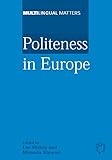Politeness in Europe / ed. by Leo Hickey, Miranda Stewart.
Material type: TextSeries: Multilingual MattersPublisher: Bristol ; Blue Ridge Summit : Multilingual Matters, [2005]Copyright date: ©2005Description: 1 online resource (352 p.)Content type:
TextSeries: Multilingual MattersPublisher: Bristol ; Blue Ridge Summit : Multilingual Matters, [2005]Copyright date: ©2005Description: 1 online resource (352 p.)Content type: - 9781853597381
- 9781853597398
- 306.44094
- P40.5.E752 E856 2005
- P40.5.E752
- online - DeGruyter
| Item type | Current library | Call number | URL | Status | Notes | Barcode | |
|---|---|---|---|---|---|---|---|
 eBook
eBook
|
Biblioteca "Angelicum" Pont. Univ. S.Tommaso d'Aquino Nuvola online | online - DeGruyter (Browse shelf(Opens below)) | Online access | Not for loan (Accesso limitato) | Accesso per gli utenti autorizzati / Access for authorized users | (dgr)9781853597398 |
Frontmatter -- Contents -- Notes on the Contributors -- Introduction -- Western Europe -- Politeness in Germany: Politeness in GERMANY? -- Politeness in France: How To Buy Bread Politely -- Politeness in Belgium: Face,Distance and Sincerity in Service-exchange Rituals -- Politeness in Luxemburg: Greetings from Foreign Parts -- Politeness in The Netherlands: Indirect Requests -- Politeness in Austria: Politeness and Impoliteness -- Politeness in Switzerland: Between Respect and Acceptance -- Politeness in Britain: ‘It’s Only a Suggestion…’ -- Politeness in Ireland: ‘In Ireland, It’s Done Without Being Said’ -- Northern Europe -- Politeness in Norway: How Can You Be Polite and Sincere? -- Politeness in Denmark: Getting to the Point -- Politeness in Sweden: Parliamentary Forms of Address -- Politeness in Finland: Evasion at All Costs -- Eastern Europe -- Politeness in Estonia: A Matter of Fact Style -- Politeness in Poland: From ‘Titlemania’ to Grammaticalised Honorifics -- Politeness in Hungary: Uncertainty in a Changing Society -- Politeness in the Czech Republic: Distance, Levels of Expression, Management and Intercultural Contact -- Southern Europe -- Politeness in Greece: The Politeness of Involvement -- Politeness in Cyprus: A Coffee or a Small Coffee? -- Politeness in Italy: The Art of Self-Representation in Requests -- Politeness in Portugal: How to Address Others -- Politeness in Spain: Thanks But No ‘Thanks’ -- Index
restricted access online access with authorization star
http://purl.org/coar/access_right/c_16ec
The study of politeness has undergone an explosion of interest since the late 1980s, involving an examination of language and languages in many societies. The present volume aims to contribute to current knowledge and understanding of the subject by giving a broad picture of politeness across twenty-two European countries, addressing the essential debates at the heart of politeness studies. Each chapter attempts to provide an empirical snapshot, based on sound theoretical principles, of the issues and practices in its own society. Some of the contributors engage directly with critical thinking on politeness theory, using data from their languages and cultures to advance theoretical frameworks, while others highlight the forms politeness takes in particular cultural contexts, analysing how individuals interact with each other in ways intended to achieve their communicative goals. The volume treats questions such as whether a given society favours positive politeness or negative politeness, the use of formal or informal pronouns of address, small-talk, conventional politeness formulas and how politeness practices change over time.
Mode of access: Internet via World Wide Web.
In English.
Description based on online resource; title from PDF title page (publisher's Web site, viewed 01. Dez 2022)


